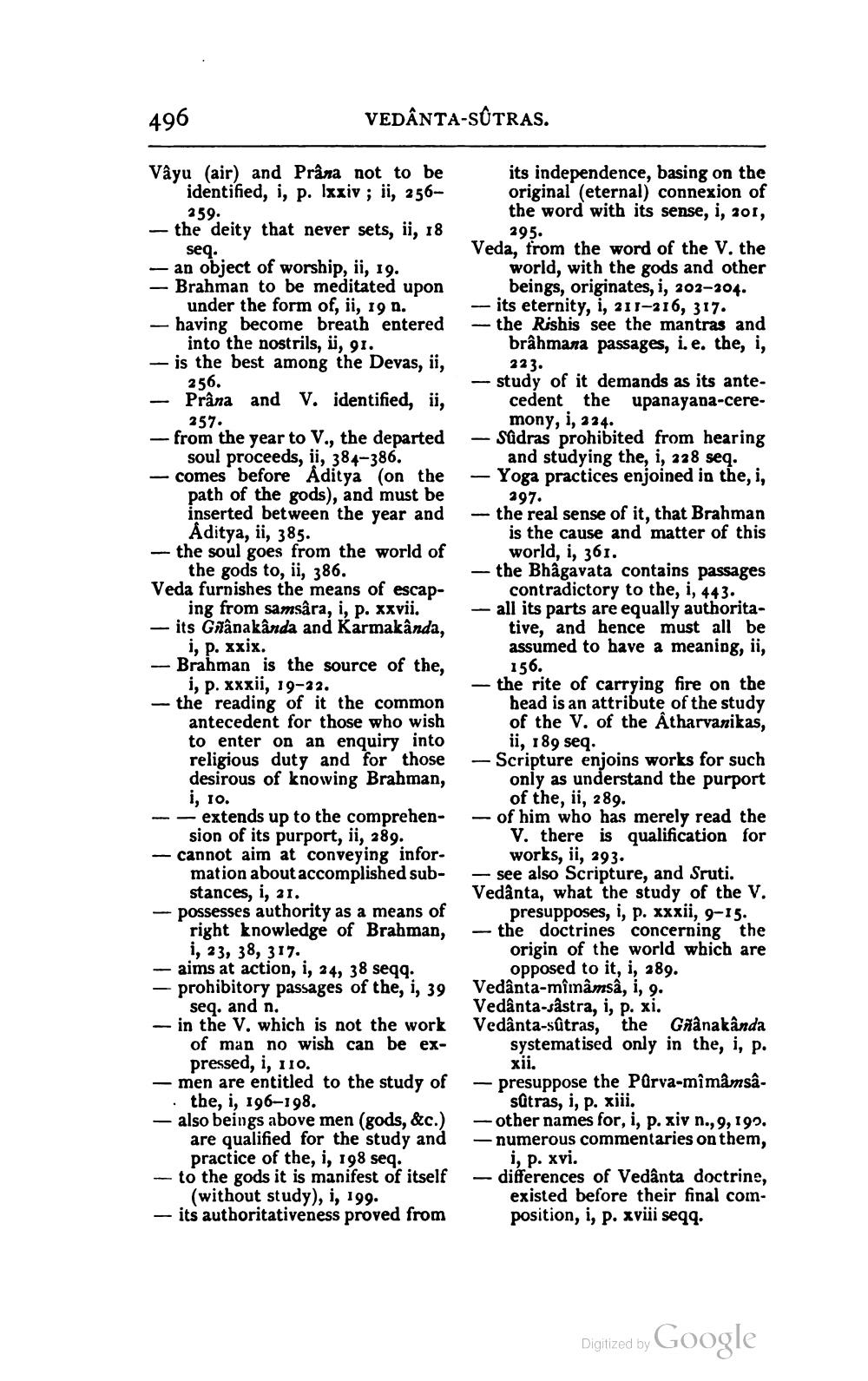________________
VEDANTA-SUTRAS.
496
Vâyu (air) and Prâna not to be identified, i, p. lxxiv; ii, 256-the deity that never sets, ii, 18 seq.
259.
- an object of worship, ii, 19. -Brahman to be meditated upon under the form of, ii, 19 n. - having become breath entered into the nostrils, ii, 91.
- is the best among the Devas, ii, 256.
Prâna and V. identified, ii,
257.
- from the year to V., the departed soul proceeds, ii, 384-386. - comes before Aditya (on the path of the gods), and must be inserted between the year and Aditya, ii, 385. - the soul goes from the world of the gods to, ii, 386.
-
Veda furnishes the means of escaping from samsâra, i, p. xxvii. -its Gânakânda and Karmakânda, i, p. xxix.
-
- Brahman is the source of the, i, p. xxxii, 19-22. -the reading of it the common antecedent for those who wish to enter on an enquiry into religious duty and for those desirous of knowing Brahman, i, 10. -extends up to the comprehension of its purport, ii, 289. cannot aim at conveying information about accomplished substances, i, 21. possesses authority as a means of right knowledge of Brahman, i, 23, 38, 317.
aims at action, i, 24, 38 seqq. - prohibitory passages of the, i, 39 seq. and n.
- in the V. which is not the work of man no wish can be expressed, i, 110.
- men are entitled to the study of the, i, 196-198.
also beings above men (gods, &c.) are qualified for the study and practice of the, i, 198 seq. -to the gods it is manifest of itself (without study), i, 199. - its authoritativeness proved from
its independence, basing on the original (eternal) connexion of the word with its sense, i, 201,
295.
Veda, from the word of the V. the world, with the gods and other beings, originates, i, 202-204. - its eternity, i, 211-216, 317.
the Rishis see the mantras and brâhmana passages, i. e. the, i,
223.
- study of it demands as its antecedent the upanayana-ceremony, i, 224.
-Sudras prohibited from hearing and studying the, i, 228 seq. Yoga practices enjoined in the, i,
297.
-
-the real sense of it, that Brahman is the cause and matter of this world, i, 361.
the Bhagavata contains passages contradictory to the, i, 443. - all its parts are equally authoritative, and hence must all be assumed to have a meaning, ii, 156.
1
- the rite of carrying fire on the head is an attribute of the study of the V. of the Atharvanikas, ii, 189 seq.
- Scripture enjoins works for such only as understand the purport of the, ii, 289.
- of him who has merely read the V. there is qualification for works, ii, 293.
-see also Scripture, and Sruti. Vedanta, what the study of the V. presupposes, i, p. xxxii, 9-15. -the doctrines concerning the origin of the world which are opposed to it, i, 289. Vedanta-mîmâmsâ, i, 9. Vedanta-sâstra, i, p. xi. Vedânta-sûtras, the Gânakânda systematised only in the, i, p. xii.
- presuppose the Pârva-mîmâmsâsûtras, i, p. xiii.
-other names for, i, p. xiv n., 9, 190. numerous commentaries on them, i, p. xvi.
differences of Vedânta doctrine, existed before their final composition, i, p. xviii seqq.
Digitized by Google




